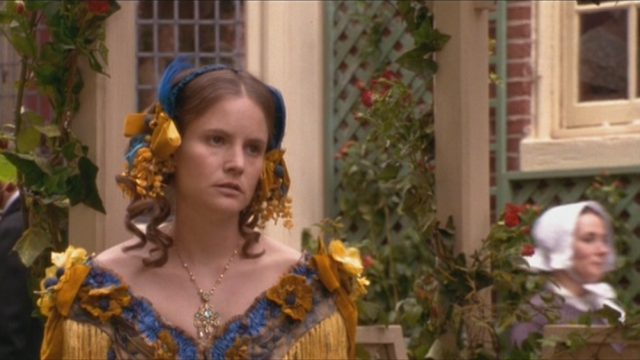One of the wonderful qualities of Jennifer Jason Leigh is that, when you look at her, you feel like you’re looking at her spirit. She’s got a raw, animal magnetism that she uses skillfully in different ways depending on the role, but I’ve never seen her deploy it like she does in Washington Square.
The character she’s playing, Catherine Sloper, is such a little weirdo. Washington Square requires the viewer to see her both through her father’s condescending eyes and her lover’s adoring ones, while maintaining some ambiguity about whether her lover’s feelings for her are authentic. Leigh plays her as as crippled by social awkwardness — perhaps she was on the spectrum before we had the language to describe it. She looks unwell and faints easily. Think Ally Sheedy’s character in The Breakfast Club for the 19th century. When the man courting her, the penniless and charming Morris Townsend, introduces Catherine to his sister, his sister assumes that her brother’s lover is her prettier cousin instead, not this gawky, awkward girl.
Yet the chemistry between the characters is white hot. You want sexual tension? Try not being allowed to touch the person you’d like to touch and see the tension become unbearable for the would-be lovers. I love how sexy piano duets are in period pieces. Who knew singing German in unison could be so hot?
It can also be hilarious, as Maggie Smith’s Aunt Lavinia sings along in turn. She’s blatantly in favor of these lovers, but doesn’t have any power to push back against Catherine’s father’s disapproval. I loved how when doors opened, Aunt Lavinia was frequently found behind them, straining to hear the drama.
SPOILERS follow from here on out:
Washington Square explores how toxic dynamics, projection, and misplaced resentment carries from one generation to another. Though Catherine’s father, Austin Sloper, well played by Albert Finney, is a doctor with an income, he also married into an inheritance when he wed Catherine’s mother, who died in childbirth. This makes Austin suspect Townsend of ulterior motives because he’s projecting the motives he fears he had as a young man onto Townsend. But it’s clear that Austin had some authentic feelings for his late wife because he feels so much resentment towards his daughter for causing her death by being born. Austin feels the way to right this guilt he has about marrying for the wrong reasons is to protect the fortune he married into, even at the expense of his own offspring.
The complexities in these characters and their relationships to each other is what makes Washington Square special. Despite Catherine being such an oddball in any other circumstance, the chemistry between her and Morris is so strong that I completely believed his intent to marry her was rooted in his real feelings for her. That he has a widowed sister with five children to support gives him greater need of the fortune, but makes him even more sympathetic.
One moment struck me as a particularly dark, but believable reason for his genuine interest in her. In the middle of saying glorious things about their love to Aunt Lavinia, he admits that part of the appeal is that he is very vain and she looks at him like he’s the only man in the world. It’s not exactly healthy, but it did strike me as quite honest and proof that there was a real connection that had nothing to do with money. I was genuinely surprised when the power dynamic shifted and Catherine became the pursuer of Morris after he had pursued her so doggedly in the film’s first half.
The film doesn’t present Morris’s courtship course-reversal as anything as simple as being deterred because Catherine no longer comes with an enormous fortune. It looked to me as if he had been driven mad by the notion that this marriage would be one without the honor of Catherine’s father’s blessing. He felt so consumed with society’s expectation that he would keep Catherine in the lifestyle she was accustomed to that it overwhelmed Catherine’s actual feelings. It hurt him to reject her, but it’s unclear how much of that pain came from not having her in his life and how much came from seeing the worst version of himself: someone who was more motivated by money than he’d like to believe. But it’s hard to blame him when he’s got so many relatives who rely on him.
Catherine ultimately beats both her father and her would-be lover at their own games by opting out of them completely. When her father’s on his deathbed, she says she doesn’t plan to marry Morris after his death, but won’t promise not to do so, which leads to her being disinherited of everything but a moderate allowance she has received from her mother and ownership of their house in Washington Square. (Joke’s on Austin because that house in Manhattan must be worth a fortune now!) But she also rejects the lover for whom she paid such a high price, as well she should. Though Morris isn’t a bad person for wanting familial financial security along with his lady love, the cruel manner in which he broke it off shows that he’s not a particularly good one either and certainly not worthy of Catherine.

